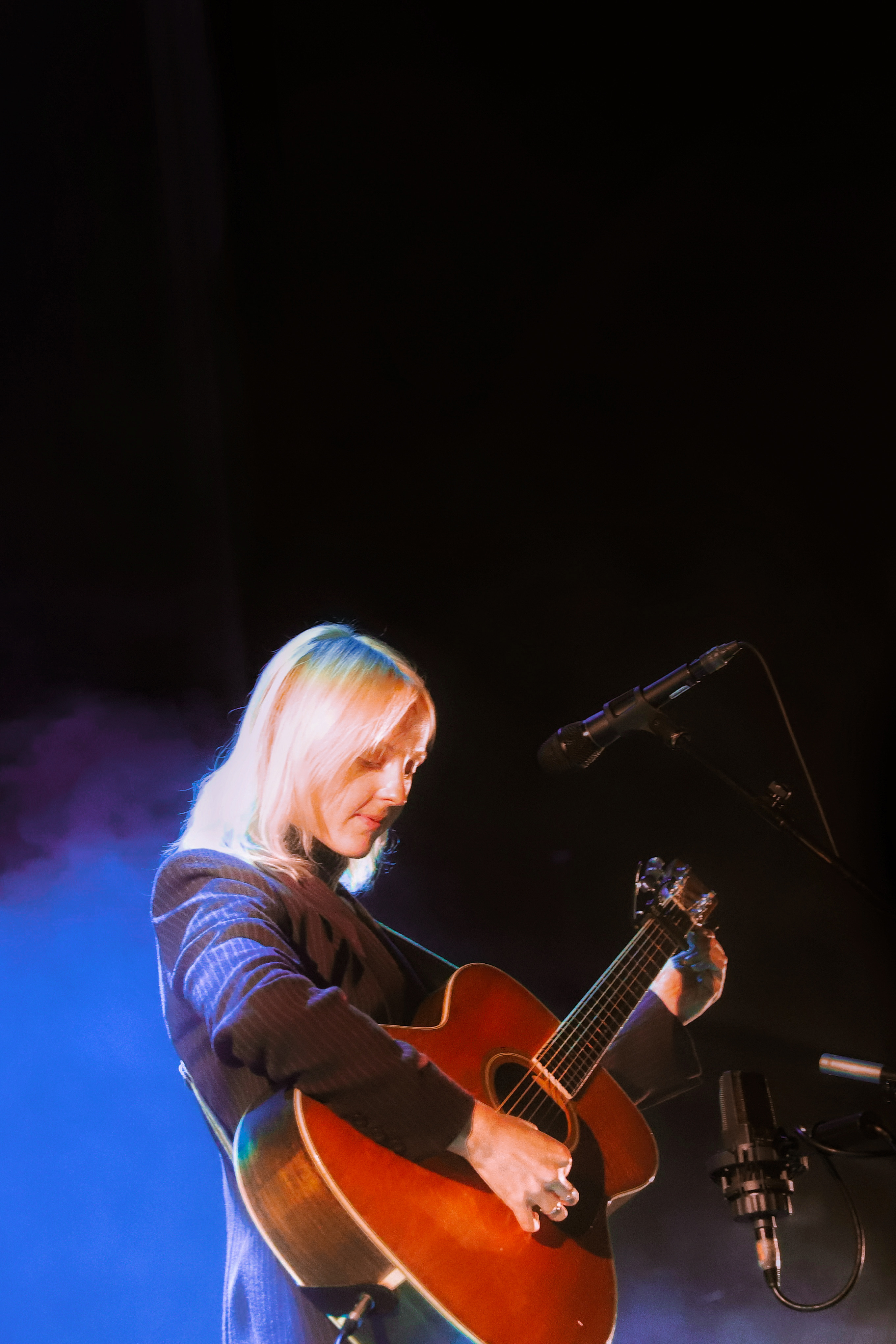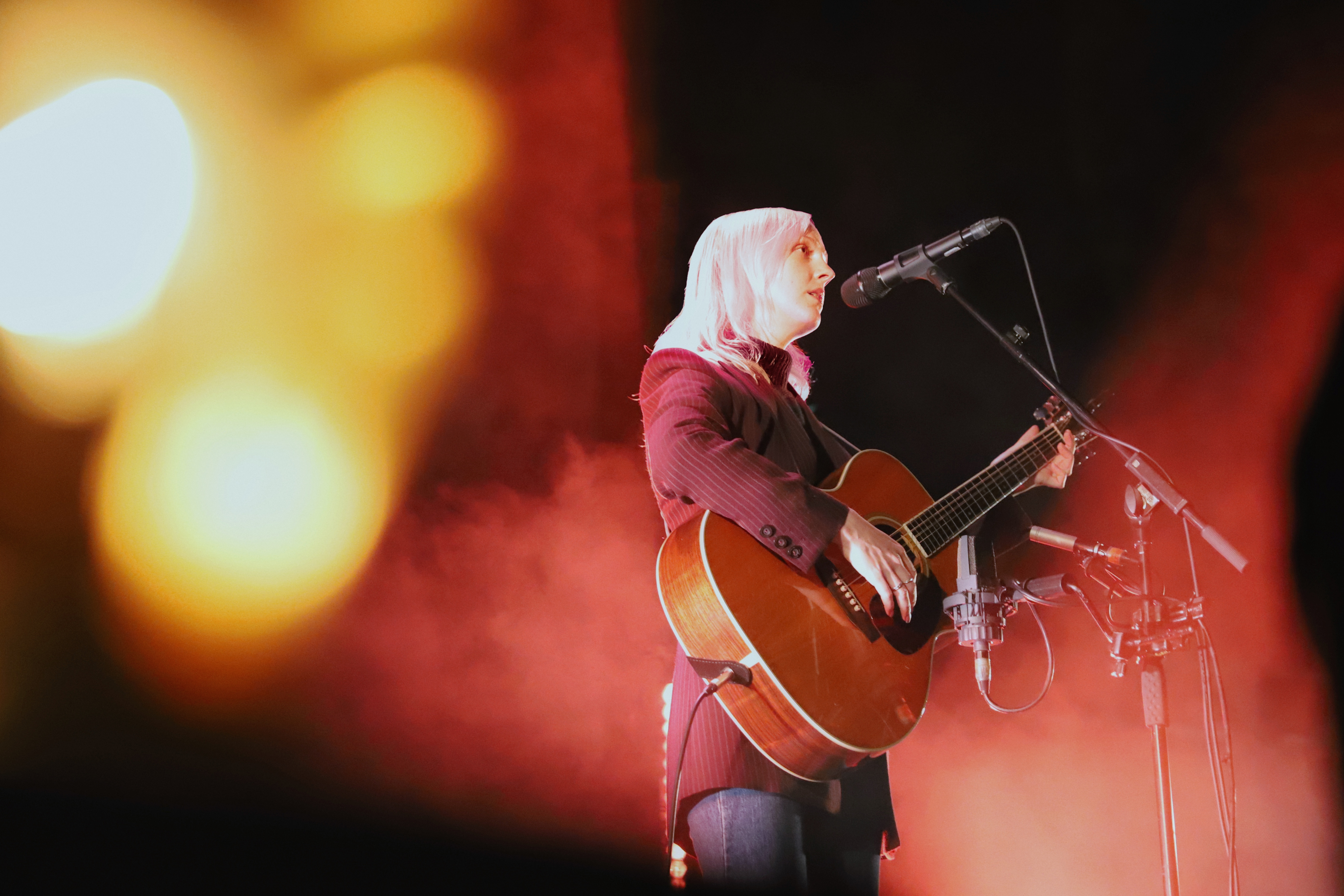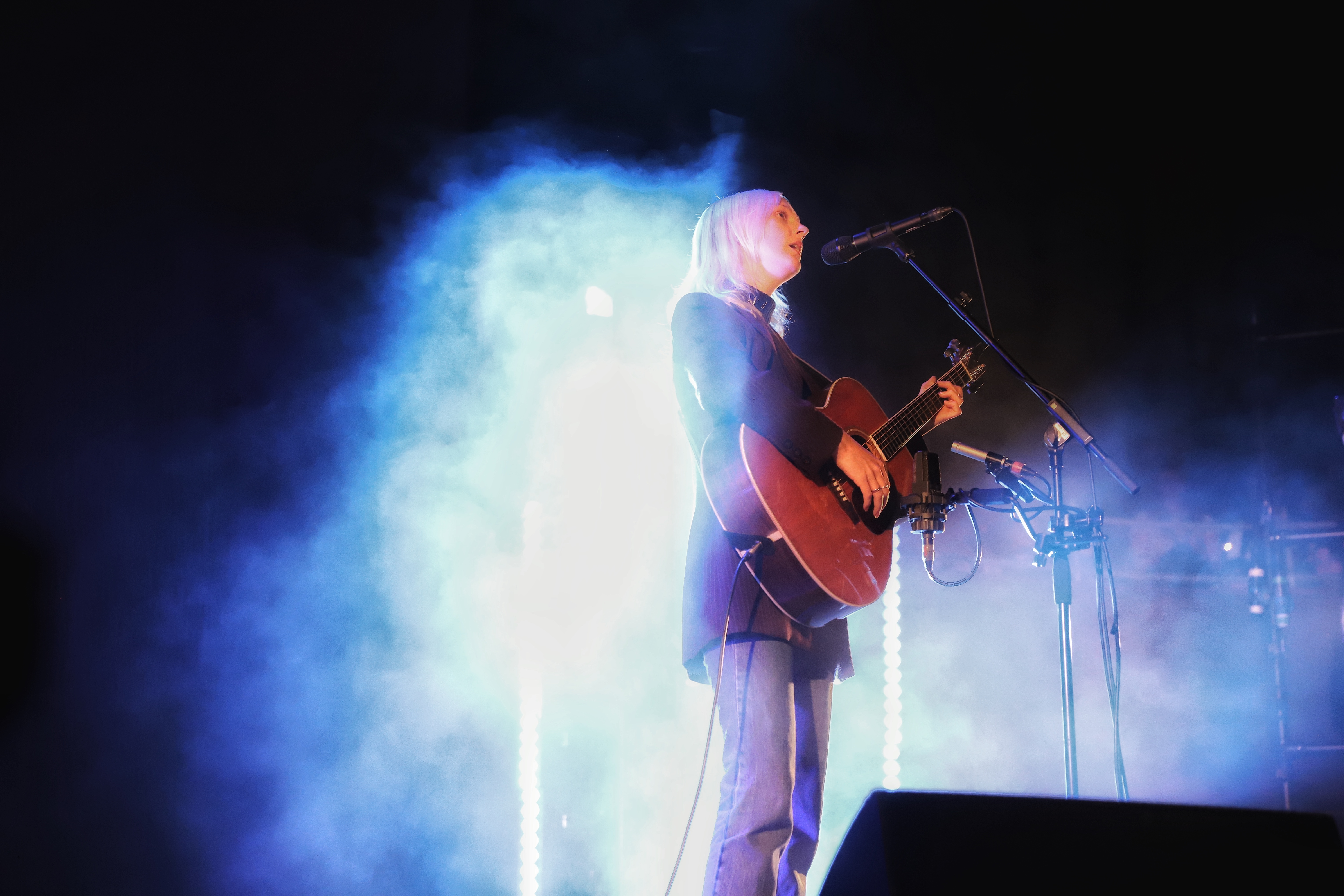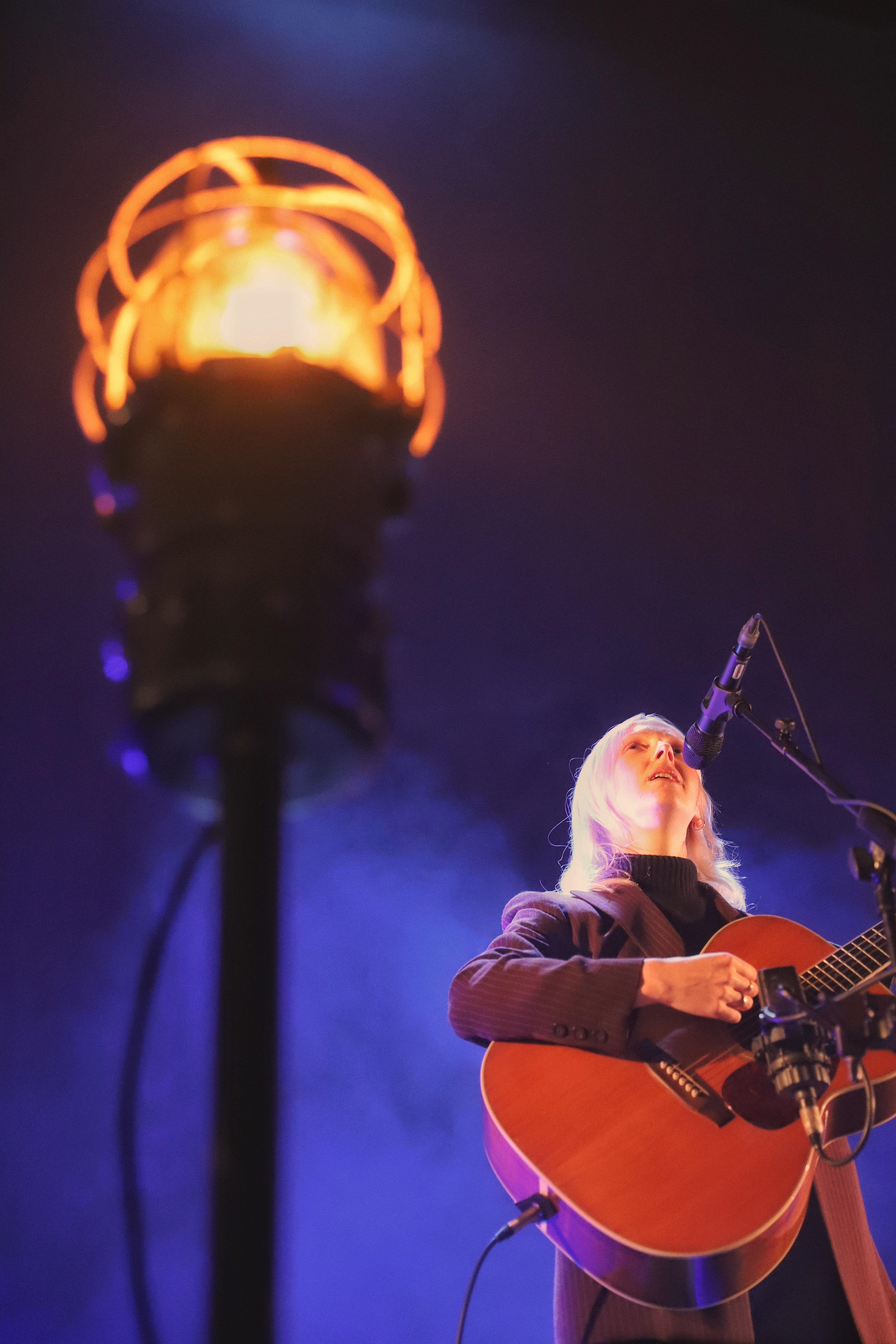LIVE:
LAURA MARLING: LIVE IN MANCHESTER
Laura upholds the solace of the grand, Grade II listed Manchester chapel.










This blog began as a springboard for live music photographers and journalists... In January 2020. Very unfortunate timing for anything new, as it happens. Ideas were quashed as soon as they sprouted, and you all know why. Something entirely beyond our control, and even understanding, as simple human beings.
For safety, out of fear of the unknown, everything halted. Live music included. DDD tried its utmost, amidst everything, to keep the kindling asmoke - even though (what we hoped to be) its main body of content was suddenly absent. It has been dearly missed but, both hesitantly and with great urgency - like all great paradoxes - audiences snaked through varied journeys to venues once again. A return to a life left behind.
It had been over 18 months since I’d last stepped foot into any sort of building with the promise of a performance inside. Anxiety had settled like dust, very much still present, but rinsed by a wash of relief. A familiarity, as if no instance had ever come between then and now, leaking in like blinding light around a doorframe.
The Albert Hall is an opulent venue with grand, arched ceilings, prodigious stained glass windows and fairy-lit balcony, managing to retain a warmth that is only further encouraged by its wide-eyed attendees. The night of the Laura Marling show, there is an air of tentativity - a shared knowledge of what we’ve all endured - but equally, a mellow, forgiving permanence that underpins the night. It’s a sold out show, yet there’s an obvious respect between everyone. Plenty of distance, some understanding faces. It’s not wall-to-wall people, leaving little room to breathe well, even though it has the opportunity to be.
The tour, in support of last year’s “Song for Our Daughter”, crystallises a lonely era - one in which Laura chose to pull said album’s release forward by 4 months, to release in April 2020 - just a month into an enforced-lockdown - declaring that she "saw no reason to hold back on something that, at the very least, might entertain, and at its best, provide some sense of union". A musical rescue of sorts, the timing of such a gentle, introspective listen was a godsend. The rest of the music world scrambled, cancelled and pushed back - but Laura’s certainty on the project’s early birth was refreshing. Her plans to tour, however, were put on ice immediately, with European and US fans - and Laura, surely - feeling a loss. But this didn’t thwart her musicality, or stop her from seeking the sort of connection that live shows yield.
Laura turned to Instagram to stream detailed guitar lessons for fan favourites every week, sitting in her front room and itemising her style of playing - reeling off techniques as if you were FaceTiming an old friend - garnering her thousands upon thousands of views, from the unversed and expert guitarist alike. In June of last year, Marling also streamed a ticketed live show from London’s Union Chapel, not dissimilar to the Albert Hall, to an entirely virtual presence of 4,000 - a number that exceeds the actual venue capacity by 300%. A prestigious follow-up in the shape of a *Royal* Albert Hall show, also in front of nobody, via the BBC Proms with a 12-piece orchestra felt like the most natural fit for Laura. There’s an archaic quality to her balladry, harking back to days of old. The ensemble therefore only imbues her acoustics, amplifying her excellent story-telling. At each interval, there is room for applause, but it does not come. Maybe instead, dotting from the privacy of living rooms. But it is not heard.
To back up the solitude most of us began to recognise, Laura re-recorded four tracks entirely acoustically - lifted from Song for Our Daughter - at her home studio in London. A product of WFH, “The Lockdown Sessions” was released at the end of a tumultuous year, and acted almost as the curtain-closer of 2020: a reprise, a little differently to how we first encountered it. The EP tracks are that bit more tender than its ‘fuller’ album alternates, but they also reflect her live show with startling accuracy - just Laura Marling and her guitar. No bells or whistles, because it doesn’t need any. It speaks for itself, it is simply enough at its most minimal.
On a Tuesday night in October, she has an in-person audience. The venue itself is bathed in rich, golden majesty and an expectant crowd, polite in their silence, let Laura steer the evening. Her choice of songs glow and unfold up into the lofty ceiling, illuminating the dusk and scarcely forming silhouettes. Launching into with ‘The Suite’, an epic, sweeping 15 minute quartet of songs, with no introduction, she has everyone captivated in an instance. The venue’s acoustics shine especially when they showcase an artist as understated as Laura Marling - every word crisp, her melody allowed to wander and pace the pin-drop quiet. This is a gathering of careful listeners, appreciative of an intimate yarn and a poetry that sentimentalises any ordinary life.
Propelled into the realms of a recognisable name at just 17, Laura navigates her expansive catalogue with such nuance and grace, flowing in between nearly decade-old songs to her most recent revelations with ease. Being witness to a woman who can adorn a stage just with her presence, and conjure up lyric and notation with such fluency, as though casting a lengthy spell, feels almost too sacred to be a part of. Laura’s intelligent songcraft and mesmerising siren vocal, that carries so honestly from how she sounds on record, has room to be dissected and pondered in the moment - like it deliberately allows for, and craves, further thought. In fact, her music bears a great, English modesty, so much so that there’s heft in its refusal, but sonically? It’s light as a feather, more often than not. The duality in her art lies here. When it isn’t exactly lilting, there’s an edge - like in “Master Hunter”, which summons a darker, more primal side of folk.
Laura’s influences are also crystal clear when watching her live. Her caramelised speak-singing, as if making a thoughtful aside, channels Joni - as do her unusual tunings (noted by her many guitar changes). Leonard Cohen’s conversational melancholy manifests itself here, too. There’s such immense maturity in Marling’s discography, there always has been, that the sophistication is a staple. It’s as if her soul has been thriving for centuries now, and she chooses to pass down her wisdom through heritage folktale, woven like gold up and down the fretboard.
It’s not all sincere: she jokes when a phone rings almost on a quarter rest, its ringtone shrill, emulating a landline. Laura stops for just a beat and looks to the source of the sound, insisting “the nineties are calling”. The audience erupts. She also trips up a few times, breaking the illusion for just a millisecond - but her playing is so intricate, her voice so panoramic, it’s hardly a surprise. “Did I forget a verse?” she asks, after finishing “Wildfire”, of 2017’s brilliant “Semper Femina”. Our brains are all a little soupy, so it’s okay. Maybe it’s a side effect of being away for so long.
She tells us a story that follows “Goodbye England”, ironically enough, about how she was tired of touring and longing to come home - a lyricised letter to her mother over 10 years ago, that is so heartfelt that it almost feels like an invasion of privacy to listen to. But it’s a classic, and is fundamentally Laura Marling. Soothing, bittersweet and careworn. World weary, but at peace with it.
Laura Marling doesn’t need an excessive stage-show to make a lasting impression. I first saw her 4 and a half years ago on a tiny stage in Stockton, and I still consider it one of the most magnetising, compelling and emotive performances I have ever witnessed. This welcome comeback in Manchester fell nothing short of spectacular. And this time, there was applause in the room. A lot of it.
